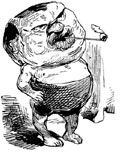
The Great Father Grump
GUEST COLUMN
The long-time pastor of my childhood church maintained a relationship of mutual contempt with his parishioners. Or so it seemed to me, as I listened to his sermons berating the congregation for miserliness or failure to keep Lent, and parishioners’ complaints about his arrogance and incompetence. My own uneasiness with “Father Grump” grew from his angry impatience with the mistakes of altar boys, real or imagined. But before he finally retired, he inspired in me a deep faith in the Catholic Church. God grant you glory, great Father Grump!
He and every priest who visited our catechism classes told us that “priests are not saints” but sinners like everyone else. It was a stock line that we found hard to believe, since priests devote their entire lives to God. But Father Grump helped us accept what both he and the catechism taught, that priests can be uncharitable and self-centered or worse, and that we honor them not for their virtue but for the awesome office they hold. We had our own example of an authentically imperfect priest who nonetheless held the power to consecrate the eucharistic Elements and forgive sins, powers received in a direct line from Christ Himself. Had he been a better man, we just might have missed this very important point.
Thanks to Father Grump, I don’t find accounts of priestly scandal difficult to believe, all the while finding them quite painful. But we don’t go to Mass because the priest is virtuous, and we don’t avoid the Sacraments if a pastor is vicious, for it’s not about him. Yet I worry about younger Catholics today — those who did not get the kind of catechesis we enjoyed fifty years ago — because for them it often is about the priest. That can prove a grave danger to faith.
Obviously I prefer good priests to bad, for many reasons, not least that bad priests offer the laity an easy excuse: If a priest can do it, why can’t we? In his Canterbury Tales, Chaucer joined many popes and saints in noting,
You May Also Enjoy
Socrates stands on a street corner in Have It Square in Camp Rich, Massachusetts, looking…
Artificial Intelligence: Garbage In, Garbage Out?... Deification Here Below... The Obligations of Priests Abroad... Flickers of Life Amid the Ruins... and more
We must try to understand the rich corpus of Catholic social doctrine in its context and entirety by reading and consulting the original documents.

